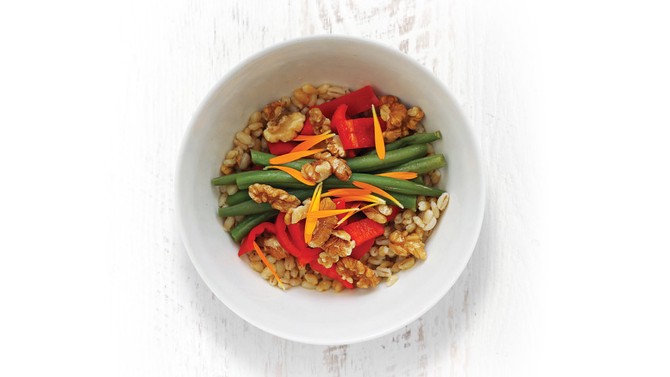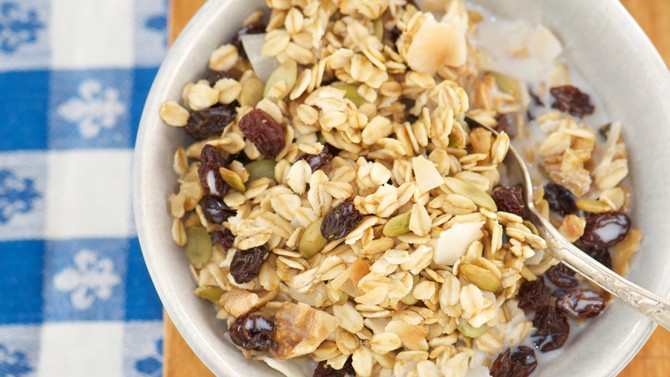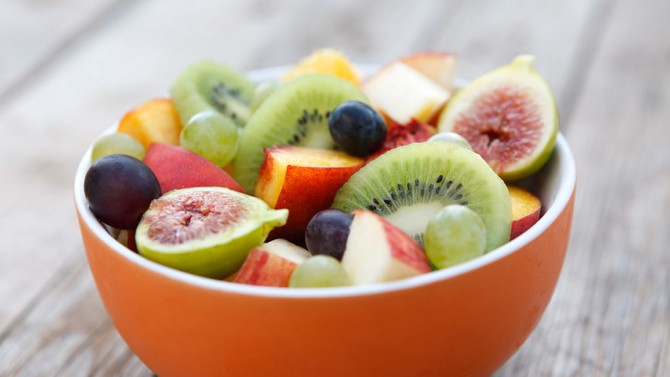What Optimists Eat for Breakfast
You know those people whose glass is always half-full? Find out what they're eating—and drinking—so you can start your own day right.
By Corrie Pikul

Photo: Courtesy of David Bez
The Happier Meal: A Breakfast Salad
Eating more fruits and vegetables makes people feel calmer, happier and more energetic, found researchers in New Zealand. They recommend 7 to 8 combined servings of fruits and vegetables every day to get the mood-boosting benefits, which is a tall order for American adults, who only consume fruit about 1.1 times per day and vegetables about 1.6 times per day. An optimist wouldn't let that news discourage her, nor would she claim to be the exception to the rule. "Optimists are very honest when assessing their problems or shortcomings," says Karen Reivich, PhD, director of training programs for the Penn Positive Psychology Center, at the University of Pennsylvania, and the author of The Resilience Factor. "But instead of feeling bad about themselves, they look for ways to improve."
Try: An a.m. salad bowl. It’ll help you reach that lofty 7 to 8 servings-per-day goal and leave you feeling satisfied but not stuffed, says David Bez, author of the new book Breakfast Love. One of his favorite combinations: green beans, sliced red bell pepper, barley and walnuts, topped with sliced Manchego cheese and a drizzle of olive oil.

Photo: PoppyB/istockphoto
The Happier Meal: A Portable Pick-Me-Up
Grab-and-go breakfasts make it easier to get out the door in the morning, leaving you satisfied with your adaptable self. That flexible attitude also puts you squarely in the mindset of optimists. They might curse their hour-long commute, "but they'll quickly move on and start thinking about what they can do to work around the challenge," says Reivich, like choosing a breakfast they can easily eat in the car.
Try: Drinkable kefir, with its good-for-the-gut probiotics. "Research suggests that a healthier gut can improve mood and even decrease anxiety," says Drew Ramsey, MD, assistant clinical professor of psychiatry at Columbia University and a co-author of The Happiness Diet. And because of its smooth, yogurt-like taste, kefir is one of the few fermented foods people are psyched to eat, Ramsey adds.
Another Idea: Fill a baggie with granola made with pumpkin seeds and almonds. Both are good sources of magnesium, which helps nerves and muscles relax and may play a protective role against depression, says Ramsey. (Adequate magnesium levels may also ward off migraines, which are linked to persistent bad moods.)

Photo: Ivan Bajic/istockphoto
The Happier Meal: Bites (and Sips) You’ll Savor
We've heard a lot about the mood-boosting benefits of gratitude—for example, how regular grateful thinking can increase happiness by as much as 25 percent —and, Reivich, says thinking grateful thoughts in the morning can set off an upward spiral of good intentions that continues throughout the day. So choose foods you're thankful for instead of foods you feel that you have to eat, and take a moment to appreciate them.
Try: Fresh, seasonal fruit at peak ripeness and flavor or unexpected farmers' market finds—both are fleeting treats. Pair your pick with a cup of hot tea or coffee. Steamy breakfast drinks are impossible to chug, so you're forced to slow down and savor them. Too much caffeine can lead to irritability and anxiety for some people, so have just 1 cup to meditate over and then decide if you need or want another.

Photo: yollopuki/istockphoto
The Happier Meal: "The Usual" (Again)
Optimists tend to like routines, says Reivich. They look forward to the meal every morning, they know exactly how it will make them feel, they can make it with their eyes closed (helpful when you’re half-asleep), and it means they aren't suddenly ambushed by mid-morning hunger pangs or tempted by surprise doughnuts at the office.
Try: Simple scrambled eggs with kale or a hard-boiled egg (made ahead of time) with grapefruit. “My number-one breakfast super food is an egg,” says Ramsey. “It has nutrients like B12 and folate that you need for a healthy brain, which helps you think more clearly.” It may also help prevent inflammation in the brain, which, researchers believe, may contribute to low moods.
Published 01/22/2016

